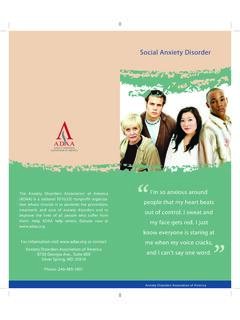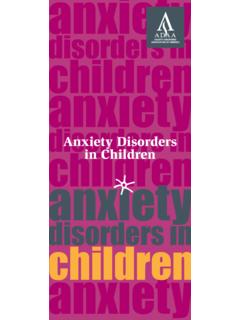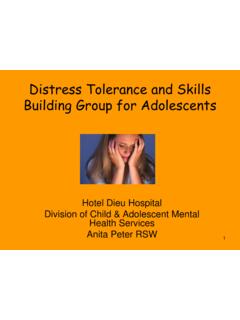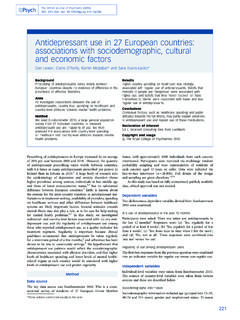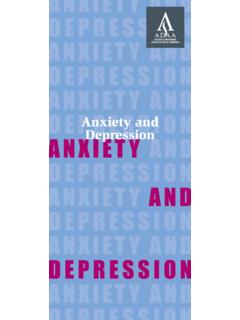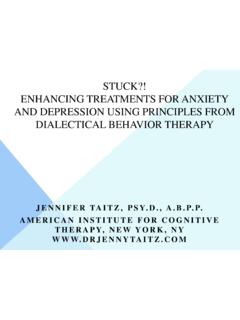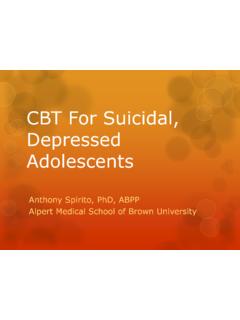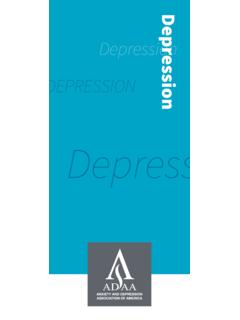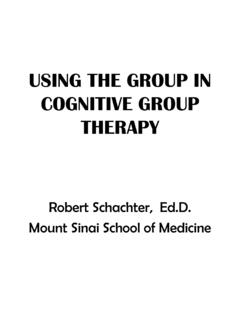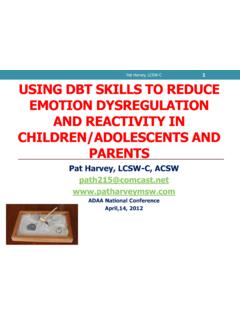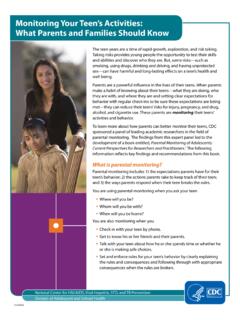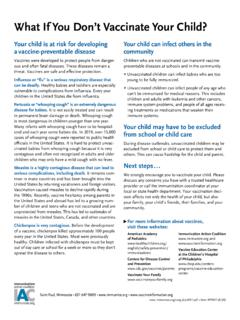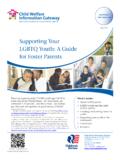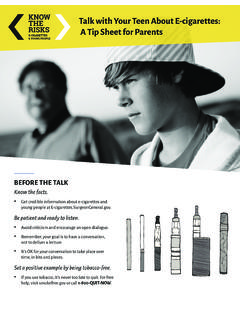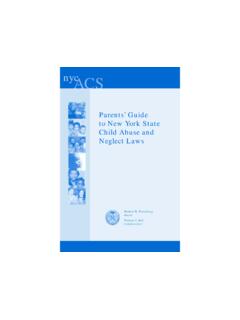Transcription of How to Help Your Child a Parent’s Guide to OCD
1 How to help your ChildA Parent s Guide to OCDO bsessive Compulsive Foundation of Metropolitan Chicagoy o u r c h i l d h a s O b s e s s i v e C o m p u l s i v e D i s o r de r : You are not alone. You and your Child are not at fault. The right kind of treatment can help your son or Does your Child have: Persistent, disturbing worries, doubts, or fears? Unreasonable, repetitive religious rituals? Uncontrollable, inappropriate thoughts or mental images? Habits or patterns of behavior that interfere with daily life? A tendency to ask repeatedly for reassurance? A need to do things just right? Problems with frequent lateness or slowness? Repetitive urges to wash, organize or check? Urges to hoard useless objects? A tendency to avoid certain places or activities?
2 your chil d m ay h ave Obsessive Compul sive Di sord er (OCD), a common and treatable medical condition that affects more than one million children in the United States alone. Thanks to enormous advances in scientific research, effective treatment is now available for OCD. If you are the parent of a Child with OCD, you may feel alarmed and confused. your Child s behavior does not make sense, and you might not know how to respond or where to turn for help . The torment of this disorder can disrupt the pleasures of childhood, interfere with family life and friendships, and cause problems at school. You are not to blame for your Child s OCD, and neither is your Child . Obsessive Compulsive Disorder is a medical condition, like asthma or allergies. Scientists believe that a difference in the way the brain processes certain chemicals leads to obsessions and compulsions.
3 3 For many years, Obsessive Compulsive Disorder was considered rare and untreatable. Research has revealed that OCD is a common neurobiological illness that affects men, women, and children of all races, religions, and socioeconomic backgrounds. Fortunately, effective treatment is now available through a form of cognitive behavior therapy that works by training the brain to respond differently to obsessions. Children with this disorder are suffering and need effective treatment to cope. There is no reason to feel ashamed to seek help . Proper diagnosis and treatment can teach your Child to regain control and manage the disorder. OCD is an enemy you and your Child can learn to defeat a parent, you are in a powerful position to help your Child by: understanding OCD finding the right therapist to provide treatment learning how to recognize and respond to symptoms at home You may also need to help teachers understand how OCD affects your Child at school.
4 Proper treatment can give your Child the skills needed to manage the disorder both at home and in the OCD can be treated, you and your Child can look forward to the future with optimism and hope. With proper treatment, your Child can learn to manage the symptoms and return to the childhood pleasures of fun, learning, and friendship. {4E vE n T h o u g h m o viE s and television shows sometimes treat OCD as a joke, it s very serious to the people who have to live with it every day and to their family members. Once considered a rare disorder, doctors have learned that OCD affects millions of people around the world. Approximately five million to six million Americans have OCD that s between 2 percent and 3 percent of the population. If OCD affects only two other family members, that means some 21 million people in the United States are touched by the disorder.}
5 OCD strikes about one in 50 adults and about one in 100 school-aged children. OCD is the fourth most common psychiatric diagnosis, after phobias, substance abuse and major depression. OCD ranks among the 10 leading causes of disability worldwide, according to one international is OCD?Approximately one out of 100 children develops Obsessive Compulsive Disorder. When a Child has OCD, a difference in the way his or her brain processes information results in uncontrollable worries and doubts called obsessions. The Child then performs compulsions repetitive rituals or habits in an effort to decrease the anxiety caused by the obsessions. But the decrease is only temporary, because performing the compulsions reinforces and strengthens the obsessions, creating a worsening cycle of OCD is diagnosed when obsessions and compulsions are time-consuming, cause significant distress, and interfere with daily functioning in school, social activities, family relationships, or normal Compulsive Disorder is more common than juvenile diabetes, but it can be difficult to diagnose.
6 Kids tend to hide their symptoms out of confusion and embarrassment. Many parents and teachers do not recognize signs of the disorder. Because scientific knowledge about OCD is based on recent discoveries, many doctors have not been trained to diagnose this disorder. Even some mental health professionals are still not aware of the effective treatments that are now availability of appropriate treatment has dramatically improved the outlook for children with OCD. Children can gain control of their symptoms and learn strategies to manage {8 Common Obsession s an d Compul sion sFEar of conTaminaTion or g Erms ..Washing/ cleaningFEar of harm or dangEr ..CheckingFEar of losing somEThing valuablE ..HoardingFEar of violaTing rEligious rulEs ..Preoccupation with religious observancesnEEd for sYmmETrY.}
7 Evening up or arrangingnEEd for pErFEcTion ..Seeking reassurance or doing things just right SymptomsChildren with OCD suffer from obsessions and compulsions that distress them significantly enough to interfere with daily functioning and are persistent fears or doubts and upsetting thoughts or images that a Child cannot ignore or dismiss. compulsions are repetitive actions or rituals intended to relieve the anxiety caused by the obsessions. The relief is temporary, however, because performing compulsions ultimately reinforces the obsessions. Some compulsions are physical, such as washing, checking, tapping, or walking in a certain pattern. Others are mental, such as silent counting or compulsive obsessions and compulsions appear related. For example, a Child with an obsessive fear of intruders may check door locks repeatedly.
8 A Child with an obsessive fear of disease may wash excessively. Other obsessions and compulsions are linked only in the Child s mind. A Child with OCD may fear that harm will come to her family unless she taps in a particular pattern or avoids using certain numbers. Parents may not be aware of the full extent of a Child s symptoms because many of them occur in the mind and others are easily hidden or disguised. A mom or dad may notice that the Child avoids certain things, seems distracted, inattentive or irritable, repeatedly seeks reassurance or confesses minor transgressions, or cannot tolerate uncertainty. A cognitive behavior therapist can help determine whether these behaviors are caused by symptoms tend to wax and wane and sometimes change from one form of the disorder to another.
9 For example, symptoms might shift from washing to checking. A Child s symptoms may improve for a time and then worsen. Sometimes there is no obvious reason for the change, and at other times a trigger can be identified. Proper treatment teaches the Child to identify OCD when it changes form and provides skills for coping with new symptoms. From time to time, booster or refresher treatment sessions can reinforce the Child s coping skills and teach him or her to manage any new OCD laboratory test can identify OCD, but a mental health professional who is knowledgeable about the disorder can conduct a specific type of interview to determine whether a person has OCD. Most professionals use the Yale-Brown Obsessive Compulsive Scale (Y-BOCS) to diagnose OCD there are two versions, one for adults and one for with OCD frequently struggle with other mental health problems, such as clinical depression, Tourette s Syndrome, ADD/ADHD, or another of the anxiety disorders (panic disorder, generalized anxiety disorder, etc.)
10 your Child s behavior therapist will help determine which behaviors are symptoms of OCD and help you understand treatment options that may be available for related Scientists understand that Obsessive Compulsive Disorder is a neurobiological illness, caused by an imbalance in certain brain chemicals. Although the precise cause is not fully understood, the disorder appears to be at least partly genetic and, in some cases, may be activated by a strep infection. OCD is not caused by a parenting style, nor is it a sign of misbehavior or lack of self control. Stress does not cause OCD, although a stressful event or life change can trigger its onset. Some common examples include: death of a loved one birth of a sibling divorce transition to a new school year move to a new house or new community vacation time other illnessLike most illnesses, the disorder is sensitive to stress, and a stressful event may worsen symptoms or lower a Child s ability to cope.
